- Home
- Alex Hughes
Sharp Page 3
Sharp Read online
Page 3
An emotion ghost, a child blinking through various ages, sat collapsed in the porch swing, despair wafting from her like incense. I stared at her in shock. For me to see her, without going down into Mindspace and with my present troubles—well, the girl had to have some significant Ability and some very strong emotions. I could feel the child’s fear and despair faintly, even through the shields.
Cherabino was holding the door open for me. I shivered, and left the child ghost and walked, one foot in front of the other, through the door. I made my shields as tough, as hard, as impenetrable as I could make them. And still I squinted against the onslaught of deep emotion, emotion like a hundred sharp razors dragging slowly through skin. I’d never felt a section of Mindspace this strong, this cloying. It was like the metaphysical equivalent of quicksand.
“About time you showed up,” a deep baritone came from in front of me. I looked up. Detective Freeman, a grouchy man with a dark complexion and scarring on the right side of his face. He was one of Cherabino’s counterparts in the homicide department, and always seemed tired when we ran into him. Today was no exception.
“Sorry about that,” Michael said.
We met Freeman’s partner, a fragile-looking man in his forties. They’d arrived twenty minutes ago. And Forensics had just gotten started.
Still struggling against the emotions surrounding me, I looked around the house. We were standing in what looked like a front living room, a television on one end across from a bulky sofa covered in frilly flowers. Judging from the rooster wall hangings, the old wooden floor, and the paper books laid out like props—and covered in a thin coat of dust—the owner liked the appearance of a country style. Oddly, a glass-and-chrome model of a skyscraper sat in the middle of the coffee table, looking out of place and aggressive.
Farther on, a narrow opening led to an eating area and what I assumed was a kitchen. The edge of a woman’s back showed, slumped into the table, a dark bloodstain the size of a pizza pan sunk into the floor below her chair. A crime scene photographer moved in front of my view, and the flash of a picture made me blink. To the left was a large wooden staircase and a large oil painting of a family, a powerful-looking man, a mousy woman who looked very familiar somehow, and a preteen girl.
Techs were everywhere, here in the living room, on the staircase, and, from the sound of it, farther on in the kitchen. The ones I could see were armed with Luminol, looking for hidden blood spatters. By the emotions hitting me now, they’d likely find a lot of them.
“What do we have?” Cherabino prompted Freeman.
“Victim is Emily Hamilton, owner of the house along with her husband—currently absent—Dan. She’s late thirties, apparent bleed out from a throat injury, seems to have more than her fair share of old cuts and bruises. The ME will have to tell you for certain, but none of them look around the time of death to me. Neighbor’s dog ran into the yard and the neighbor saw the scene through the window. He’s already been interviewed, seems clear.” He paused. “Thanks for doing this.”
Cherabino shrugged. “Not a problem.”
“Has anyone talked to the husband yet?” I asked.
“Not yet. He’s AWOL.” Freeman’s face took on a gesture of hostility, what seemed to me far out of proportion to speaking up. I wasn’t making any effort to read him—even if my telepathy was up to snuff, this house would be a nightmare—but according to his facial cues he resented me. I wondered if other personnel were being laid off, real cops this time. If so, I could be in trouble with more folks than just Clark.
Cherabino glanced at me. “Well, even serious injuries aren’t uncommon in domestic abuse cases, and it doesn’t take much to go too far. Where is the husband?”
Freeman turned away from me like a dismissal. “Didn’t come into work today, according to his supervisor. Architects’ office, though I’m told he’s a civil engineer. I’ve gone ahead and flagged the car with the local patrol. Something will pop.”
“Thanks. Where’s the daughter?” She gestured to the painting.
“Still in school. We have an officer going down to meet her when it’s over. Supposedly there’s a sister close by. Hell of a way to lose your parents.”
“Assuming the husband doesn’t turn up,” Michael said.
“You a rookie?”
“That’s right.” Michael’s voice was even, too even, like the question bothered him.
“Well, Hwang, trust me, if the spouse don’t turn up in a day or two, either he’s dead or he killed her. Either way, that little girl has lost both her parents.”
Michael talked to the detective a little longer. I tried to keep up with all the new information, my attention feeling far too short for the situation. Cherabino paced through the opening into the kitchen, and, after as long of a break as I could get away with, I followed. This was going to be hellish.
I was still shielded up to my gills, the steady barrage of sensation unsettling after so much quiet from the telepathy over the last few weeks. My tolerance was down, and the constant waves of sensation felt like sandpaper on my mind.
“You’re looking green,” one of the forensics techs commented in my general direction, not in a friendly way. That was Jamal, a smart guy with an attitude who hated telepaths in general and me in specific. The irony was, he was getting twitchy enough here I thought he might have a trace of telepathy himself.
“Thank you,” I said, instead of barking at him.
He looked at me funny, but didn’t say anything. Score one for me.
Cherabino was already circling the dark wooden table, frowning as she looked for a good angle to see the body. The crime scene photographer was kneeling at an angle, and took another flashbulb. I crouched, careful of where I put my shoes on the dull antique tile.
A woman. A blond woman in gray-patterned pajamas with little clouds on them. The same woman as in the oil painting, I assumed, though from this angle it was hard to tell. She was slumped forward, her forehead resting in a cereal bowl full of Cheerios. Spilled, sour protein-plus milk had flowed out of the bowl in thick trails, off the side of the table, and hit the floor, Cheerios and all. The milk and cereal were congealing, and on the edges, mixing with the blood, until it made an odd pink Jell-O tide. Small dots of blood, and milk, and occasional Cheerios sat on the floor and wall to her right, only one line like she’d thrown her arm up and then stopped suddenly.
The victim was collapsed in on herself, arms dangling, blood covering the entire front of her body, legs, and the chair seat. Her neck was folded down on itself; all I could see was the bloody line. There was clearly some large damage to the neck, with all this blood—not only down her front and along the floor and wall in that line, but puddled under her chair, soaked into the tile in a stain maybe two feet across. Maybe less; I was eyeballing it from a funny angle. Her back was covered in multicolored healing bruises, and one long half-healed scrape; like Freeman had said, far too old to have been done around the time of the murder.
I crouched down, to see around the table, and looked back at the body. She didn’t have a bra on; the light gray shirt soaked with blood covered her like an obscene wet-T-shirt contest. It made me want to throw up, suddenly, intensely, and I swallowed, looking down.
Cherabino asked Freeman, “Have we found the blade he used yet?”
Freeman shook his head. “All the kitchen knives in the block are clean. If there’s something else, we haven’t found it. Maybe he took it with him.”
“Hmm. Any way we can get a better look at the neck?”
“Jim, you done?” Freeman asked the crime scene photographer from the doorway. “I don’t guess the coroner’s going to care one way or the other.”
“I care,” I said.
“What?” Freeman responded. “Why is that?”
I forced myself not to respond to the hostility; the constant barrage of emotion was already giving me a headache, but I
couldn’t afford to antagonize yet another detective. “Look, if you want me to take a look at the Mindspace signatures around the body, we need to keep the immediate area as pristine as possible.” I was not looking forward to this, not at all, even assuming I could read something deeper than the ambient emotion.
Cherabino frowned. “Fine, we’ll back up a bit.” She pulled Freeman aside. “How do you want to work the case transfer?”
I stopped paying attention; the steady sound of talking wouldn’t bother me, not if no one was upset.
“Could you back up maybe four feet?” I asked Jim, the crime scene photographer, largely to get another moment to catch my breath. Cherabino was paying just enough attention, the cops were paying just enough attention that I couldn’t walk away for a break.
I crouched there and pretended to be studying the victim while I got myself together. Telepathy and Mindspace sometimes were about faith. You got what you believed you’d get. So here, now, I had to convince myself I wasn’t going to fail. But the sidelong glances from the cops around me just kept chipping away at that belief—they wanted me to fail. As the crime scene photographer finished packing up his kit and moved out, I stood, wishing for a cigarette or a vial or anything.
“Ahem,” Cherabino said. Through the Link she was already ready to brace me, to provide me with an anchor back to the real world. She was holding out that careful mental hand, ready if I didn’t grab too much, if I was polite and distant. She knew I needed this at a scene, and she liked the results enough to put up with it.
I lowered my shields, slowly. Like a frog in a pot of increasingly hot water, I could adjust—to a point. Mindspace screamed of misery, of desperation, humiliation, control, and pain, and waves of it washed over me over and over, the water coming to a quick boil, blistering my mind. And over it all, a high-pitched plea of disbelieving, choking death.
I felt a line, around my throat, pulling, pulling, until something in my throat broke, cutting, cutting, until panic set in and my fast-beating heart threw blood out of my body, spurt after spurt until I knew I would die, until my mind screamed what my voice could not. Screamed over and over again.
The sharp pain of him calling me worthless, ugly, nasty, worthless whore, over and over again, until I could hear his voice in my head . . .
A fist, hard, across my cheek, a hand ripping off my skirt . . .
Despair like poison, overwhelming, sinking into my bones . . .
The little bit of me that was still Adam grabbed for Cherabino with all I had. I was floundering. I was melting. She was still holding out a mental hand and I grabbed.
She almost dropped me, almost kicked me out in panic, feeling the edge of the sharp pleading pain. But she held on. Stilling the pain, stilling the response, like it was a migraine and she, under it. And her stillness—her rocklike stillness—brought me back into stillness too.
The fear, the pain, the choking death still lingered, along with years and years of abuse—but it didn’t control me anymore. I paused, able to think again. Able to be surprised. I didn’t know Cherabino could do that.
I breathed. Breathed over and over again, reestablishing me. I was not that woman. I was not what she had become. I was not. I was Adam, a telepath, and a guy. A single guy with battle training, not a victim, not a victim ever. Not ever anymore.
Go, Cherabino said, in that forceful, strained stillness. In the distance, we heard Freeman say something to her, repeating something she still didn’t understand. Go, damn it. I can’t do this forever—it hurts.
Mind aching but with no choice, I obeyed. I sank into Mindspace, into the depths, until it was all I could perceive. A place where distance, location, emotion, were felt rather than seen, like the echolocation of a bat, the waves of the world focused back in the deeps. It was a place utterly without color—except for the yellow cord, yellow where no yellow should be, a cord that led back to Cherabino. The shallows wavered, strongly, as my battered, injured brain struggled to focus. I tried to push through—I tried—
In front of me, where the woman’s body would be in real space, was a hole, the space left by a death when a mind went . . . wherever minds went when they died. It was fading fast, a smudge, nearly gone, but I would still avoid it. Falling In didn’t happen often, but you didn’t want to chance it, not ever.
Mindspace started to waver, in and out, in violent ways I knew were all about me—my injury, my inability. I swallowed it down and forced myself to focus past the pain, pushing no matter what it took—
The screaming here was so loud, the images, the despair so pressing I could feel water leak from my eyes, sheer pressure of emotions pressing, pressing, the fabric of the space tearing, tearing at my mind until it rang. But I held, and held, and learned—mind shaking—to see, slowly, in flashes, beyond it.
And, like a lid snapping into place, the world steadied. There was the hole, there was her death—I moved carefully, spiraling slowly in tiny degrees to look at different angles. Through the pain, I tried to think. Tried. In little bits.
From the neck wound direction (back and up) and the fact that she’d fallen forward, he’d attacked her from the back. I looked there, specifically, over the ambient screams, and breathed in the space, studying every smell, every trace left behind. My head pounded, the edges of the world streaking like watercolors, but I was almost done.
There. Calm. Calm, with a faint dark undercurrent. Sharp focus, sharp pull, sharp satisfaction, and above all calm. Dark, beautiful, deep calm with a sharp edge that made me feel . . . accomplished somehow. Subtle, dangerous accomplishment, one less problem to solve, one more success to report.
Report? Report. He . . . he? Yes, a man, a man who had done this before, many times before. A man with someone to report it to.
And the woman—that twisted-up mind—I knew that mind. Or I knew what it had once been.
The emotions of the scene swelled again, the woman’s silent screams drilling into my skull. And the pain was overwhelming, tearing, and the world was streaking apart until there was nothing left.
You okay? came Cherabino’s thought again, frustrated. Tap, tap, her mind against mine, tap, tap, as if she could somehow feel my distress and reacted with impatience instead of care. Tap, tap, along the long yellow line back to the real world.
I followed that line, hand over hand, inch by painful blind inch, laboriously surfacing, one overwhelming moment at a time. She kept tapping. She kept pushing. It was the only thing that got me all the way there.
I woke to the clear view of the floor and my knees, twelve inches from the bloodstain, my nose overcome with bad smells. I hadn’t thrown up. I could say that much. And—mind shaking, aching, shivering in reaction pain—I realized I was back to mind-deaf. My head rang with pain, pain—but no emotion. I was deaf and blind again.
“You okay?” Cherabino asked.
I shook my head—and immediately thought better of it; the movement made the world spin.
My eyes caught the victim’s foot, her bare foot on the tile, and I saw a small tattoo, a circle of wavy lines, neurons, encircling a stylized S and Q. I sat down hard, on the tile. I knew that tattoo.
I knew that tattoo, and in combination with it the female mind, or who she’d once been. Her name hadn’t been Hamilton when I’d known her, but she hadn’t been married. Emily, her name had been. Even through the overwhelming pain in my head, I couldn’t let go of the thought. Emily had been one of my best advanced students, years ago. Before it all fell apart. Before her mind twisted into a knot—into something not an Abled mind anymore. Before I’d done the unthinkable. A miracle I could feel her at all, here, but great pain—well, great pain had been known to blast through incredible barriers.
“Are you okay?” Cherabino repeated.
I fought the guilt and the disorientation of seeing Emily again, seeing her dead. I fought the exposure sickness, the injury. I sat on them, hard, an
d built a barrier between us with bleeding fingers. Cherabino couldn’t know. She knew too many of my failures as it was.
One small knee shuffle at a time, I moved back, away from Emily. It wasn’t her fault she smelled of urine, dried blood, and darker things, but it wasn’t mine either.
“Well, did the husband do it?” Freeman asked.
“Are you okay?” Cherabino repeated.
I pulled myself to my feet and fished out my sunglasses over my now-light-sensitive eyes. “Unless the husband’s an ex-SEAL or something,” I said in a rasp, “somebody else did it. And now, unless there’s some kind of emergency, I’ll be in the car.”
Uncaring of reactions, I stumbled out of the devil house, away from the seat of every failure I’d ever had, down the stupid steep stairs, and climbed into the backseat of the cop car. I needed to be horizontal. Now.
CHAPTER 3
My mind threatened to pass out, once, twice, then finally stabilized as I held on to consciousness through sheer will and training. My guilt helped there, the guilt of what I’d done, guilt that burned like volcanic ash in my belly. The guilt that would never, never leave me. I would have walked over red-hot coals to fight that guilt, to do something productive. To fight for Emily.
At the Guild, I’d been a professor of Deconstruction, a lucrative specialty, the folks who could put you in a coma or take you out of one, change the structure of your mind so you saw in color for the first time or could recognize your wife’s face for the first time in years. That was the stuff you’d pay the sun and the moon for, and that was the stuff routinely making Deconstructionists and the Guild millions. I taught that stuff, the advanced Structure lessons like the final years of neurosurgery training, the capstone courses before you went out into the world. By the time they’d gotten to my classes, the students had jobs lined up, and were well on their way—assuming hard work and discipline—to a career that would buy them anything they wanted.

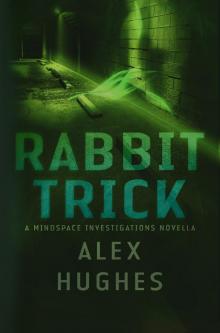 Rabbit Trick: A Mindspace Investigations Short Story
Rabbit Trick: A Mindspace Investigations Short Story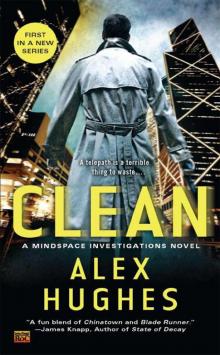 Clean: A Mindspace Investigations Novel
Clean: A Mindspace Investigations Novel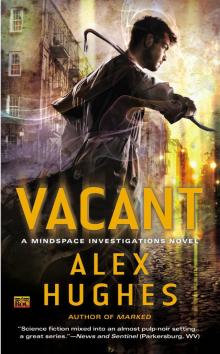 Vacant
Vacant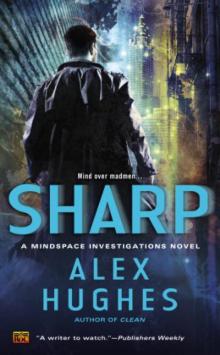 Sharp: A Mindspace Investigations Novel
Sharp: A Mindspace Investigations Novel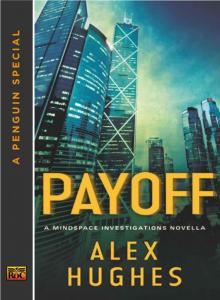 Payoff
Payoff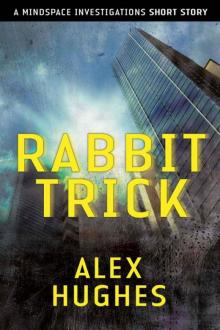 Rabbit Trick: A Mindspace Investigations Novella
Rabbit Trick: A Mindspace Investigations Novella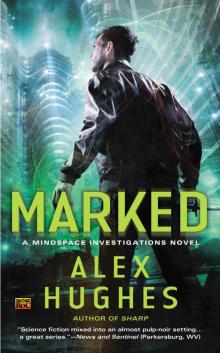 Marked
Marked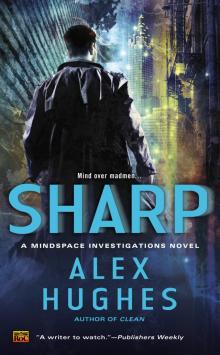 Sharp
Sharp